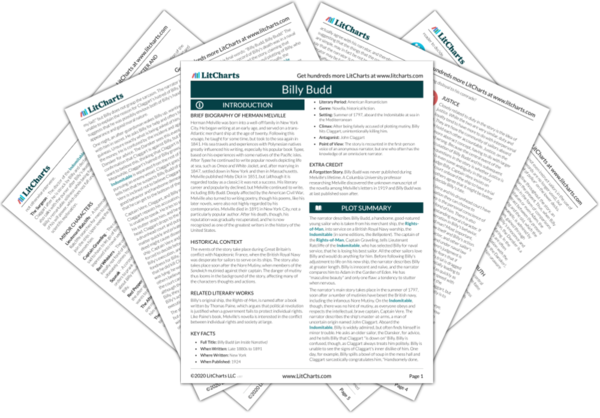Closely related to duty in the story is the idea of justice. While the two are very similar, duty and loyalty tend to have more to do with interpersonal relationships. They are how the community of sailors aboard the Indomitable hold each other accountable. Justice, on the other hand, is a more abstract concept, having to do with larger issues of right and wrong. Because the central event of the story is the false accusation of Billy Budd and his subsequent trial, one of the main questions in the story is whether justice is served to Billy. There is even some ambiguity in the story regarding who is fit to judge Billy. Captain Vere insists on assembling a drumhead court onboard the ship to have a trial immediately, even though others agree that it might be better to wait and have an admiral decide Billy's fate.
In deciding the case, Captain Vere and his drumhead court have a number of aspects of the situation they can choose to consider or disregard. First, there is the personal conscience of those judging Billy, who are quite fond of him. There is also Billy's generally good nature and upstanding moral character. If striking Claggart was an unusual aberration in Billy's behavior, should Vere punish an ultimately good man? Most important, though, for Vere and his court, is the law itself and Billy's action. Regardless of Billy's intentions, his character, and other sailor's affection for him, he killed another sailor and under naval law has earned the punishment of death. But Vere's judgment is also motivated by practical considerations. He fears that if news of Billy's possible plot spreads or if Billy's trial is dragged on, dissent may spread among his sailors, potentially leading to a mutiny. He therefore wants to finish Billy's trial as quickly as possible, and this may be a motivating factor in the speed with which he decides that the court should not consider the circumstances and motives behind Billy's striking Claggart, but only "the blow's consequence, which consequence justly is to be deemed not otherwise than as the striker's deed."
As this quotation makes clear, Vere adopts an eye-for-an-eye, tooth-for-a-tooth idea of justice: for killing Claggart, Billy now deserves to be killed. But is this a just punishment? Earlier in the story, the narrator informs us that those involved with the Nore Mutiny were able to absolve their wrongs by serving valiantly afterwards. Why should Billy not get a chance to redeem himself with better future behavior? Part of the reason for his sentence may be to deter any other sailors from considering mutiny. After all, Billy Budd's good behavior was largely the result of his witnessing a sailor being harshly punished for bad behavior. Vere's sentencing of Billy might not be just, but it is practical, and ensures the continued well-being of his ship. Nonetheless, in attempting to be an effective, practical captain, Vere neglects broader questions of right and wrong; Melville leaves these questions open-ended, for the reader to decide.
Justice ThemeTracker

Justice Quotes in Billy Budd
Struck dead by an angel of God! Yet the angel must hang!
Feeling that unless quick action was taken on it, the deed of the foretopman, so soon as it should be known on the gun decks, would tend to awaken any slumbering embers of the Nore among the crew, a sense of the urgency of the case overruled in Captain Vere every other consideration.
For the time, did I not perceive in you—at the crisis too—a troubled hesitancy, proceeding, I doubt not, from the clash of military duty with moral scruple—scruple vitalized by compassion.
But in natural justice is nothing but the prisoner's overt act to be considered? How can we adjudge to summary and shameful death a fellow creature innocent before God, and whom we feel to be so?
















